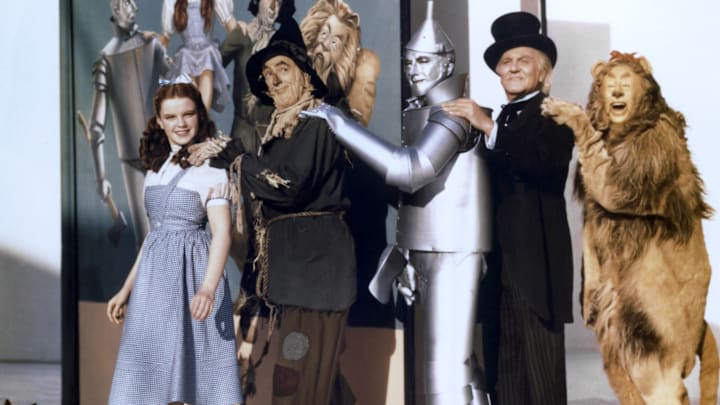In the 1980s, the U.S. Navy carried out a futile search for a woman who didn’t exist. The Naval Investigative Service (NIS) had learned that gay men sometimes referred to themselves as ‘friends of Dorothy,’ and assumed that, as Randy Shilts explained in 1993’s Conduct Unbecoming: Gays and Lesbians in the U.S. Military, “a woman named Dorothy was the hub of an enormous ring of military homosexuals in the Chicago area.” The NIS made it their mission to find this elusive Dorothy, thinking they could get her to reveal the names of gay Navy personnel.
But as members of the gay community already knew, the phrase didn’t actually refer to a real woman—instead, it was a discreet way for people in the closet to identify each other.
While it’s not always easy to come out these days, in decades past, the persecution of LGBTQ+ people in the U.S. was so severe that they created code words and phrases to communicate in safety. For instance, instead of dangerously outing themselves, gay people—particularly gay men—would ask, “Are you a friend of Dorothy?” Fellow gay people would answer “yes,” while heterosexuals would take the question at face value, replying “no” or “Dorothy who?”
Although it’s not as commonly used anymore because of the wider acceptance of queer people, the saying still crops up in movies and TV shows, from Clueless to The Crown. But who was Dorothy, and how did she wind up in the euphemistic phrase?
Will the Real Dorothy Please Stand Up?
The origin of friend of Dorothy isn’t concrete, but there are a few theories about which Dorothy is being referenced. The most popular suggestion is The Wizard of Oz’s Dorothy Gale, played by Judy Garland. Dorothy befriends social outcasts the Tin Man, the Scarecrow, and the Cowardly Lion—all of whom can be seen as gay men. The Cowardly Lion, in particular, is often viewed as queer-coded thanks to his campy mannerisms and describing himself as a “sissy” and a “dandy” (the bow in his mane doesn’t hurt, either).
Garland also became a gay icon, which may have further bolstered the phrase. Queer cinema academic Richard Dyer told Entertainment Weekly that Garland’s gay icon status was due to her difficult personal life echoing the queer experience, her performances often being camp, and the fact that “she was surrounded by gay men and [worked] closely with them, so she was very inward with that culture and it became part of her vocabulary.”
It has been theorized, however, that the phrase predates Garland’s ruby-slipper-wearing Dorothy, possibly tracing its roots to that character’s source in L. Frank Baum’s Oz books. In 1909's The Road to Oz, Dorothy is told, “You have some queer friends,” to which she replies, “The queerness doesn’t matter, so long as they’re friends!”
Another theory links friend of Dorothy to witty writer Dorothy Parker. The story goes that during the Jazz Age, Parker would invite gay men to her lavish parties. According to a letter published in the Los Angeles Times in 2001, “guys whose names weren’t on the guest list crashed the gate as ‘friends of Dorothy,’ an idiom among Manhattan socialites referring to any unfamiliar character.”
Other (less commonly suggested) possibilities include writer and actress Dorothy Dean and socialite Dorothy King, both of whom also kept the company of gay men.
A Wild Dorothy Chase
In the early 1980s, Mel Dahl was discharged from the Navy after admitting that he was gay when officially questioned. (He later sued over his termination and won). Dahl told a newspaper reporter that he wasn’t the only gay person on the Great Lakes base, leading the NIS to launch a hunt for gay sailors.
Although the NIS’s search for Dorothy was a wild goose chase, the military had an unfortunately high level of success in identifying and firing LGBTQ+ soldiers. In the years before the 2011 repeal of the “Don’t Ask, Don’t Tell” policy, it’s estimated that around 100,000 people were expelled from the military because of their sexual orientation. In its misguided mission to find the real Dorothy befriending gay people, the U.S. government proved the community’s need for the code in the first place.
Read More About LGBTQ+ History:
